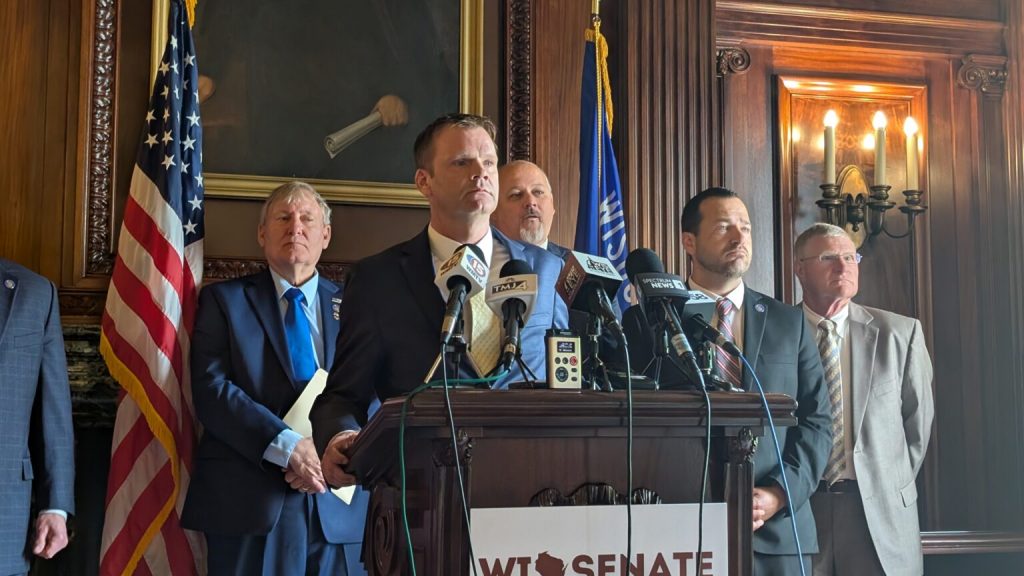Parties Still Apart on State Budget
Republicans want a meeting with Evers. Democrats criticize GOP Senate bills as minor items.

Senate Majority Leader Devin LeMahieu (R-Oostburg) said during a press conference ahead of a Senate floor session Thursday that Evers’ office has had lawmakers’ plan for a tax cut since March and that they have asked Evers for a list of specific items that he would want in the budget to agree to cutting taxes. (Photo by Baylor Spears/Wisconsin Examiner)
State budget negotiations were top of mind for lawmakers Thursday, even as the Senate took action on a variety of bills, with Senate Republicans calling for a meeting with Gov. Tony Evers and Democrats calling on Republicans to support Evers’ budget requests.
The Wisconsin Legislature is in the process of writing the next biennial budget, and Republicans are intent on passing a tax cut this session after failing to get Evers’ approval for a proposed cut last session.
Republican leaders have said they want an agreement on the tax cut before allocating spending to other priorities, and are waiting for Evers to schedule an in-person meeting with them to work it out.
Senate Majority Leader Devin LeMahieu (R-Oostburg) said during a press conference ahead of a Senate floor session Thursday that Evers’ office has had lawmakers’ plan for a tax cut since March and that they have asked Evers for a list of specific items that he would want in the budget to agree to cutting taxes. However, LeMahieu said they haven’t been given any details in the last several weeks.
“Speaker Vos and I provided the governor with a series of times [to meet] into next week as a last-ditch effort to preserve these good faith negotiations,” LeMahieu said. “I hope sincerely that he accepts… one of those dates next week. It’s imperative that we meet by the end of next week at the latest to stay on schedule to pass a budget by the end of the fiscal year. It’s as simple as that. Time’s ticking… and if we’re going to work to get a budget passed, we need to meet with the governor next week.”
LeMahieu said GOP tax goals include exempting income for retirees in Wisconsin to encourage them to stay in the state and increasing the second-tier tax bracket, similar to a bill the governor vetoed last session. LeMahieu said the new tax bracket won’t reach as high up the income ladder as the vetoed one.
Assembly Speaker Robin Vos (R-Rochester) said on Tuesday that work on the budget is “on pause” until legislators get an in-person meeting with Evers and that their preferred option is “to be able to get an agreed upon tax cut so that we know we have X dollars to invest in schools and health care and all the other things that are important.”
LeMahieu said that the latest Legislative Fiscal Bureau report would also be pivotal in negotiations because it will help lawmakers understand “what kind of tax cut we can afford” and “what kind of other investments we can afford.”
The Legislative Fiscal Bureau projected in the fiscal estimate released Thursday afternoon that the state will finish the 2023-25 fiscal year, which ends June 30, with a $4.3 billion budget surplus, which is slightly higher than the estimate from January. However, the estimate also found that tax collection will likely be lower over the next two years.
“While we are not surprised by these new estimates, we remain cautious as we work to craft a budget that invests in our priorities, funds our obligations, and puts the State of Wisconsin in a strong fiscal position for the future,” Joint Finance Committee Co-chairs Rep. Mark Born (R-Beaver Dam) and Sen. Howard Marklein (R-Spring Green) said in a statement.
The lawmakers said that the estimates are a sign that they need to continue to approach the budget in the same way they have in the past. They also called on Evers to “take these revenue re-estimates seriously” and to “come to the table with legislative leaders and work with us to craft a reasonable budget that works for Wisconsin.”
Democrats on the Joint Finance Committee said in a statement that the estimate is a sign of the decline the economy could face due to Trump administration tariffs.
“Now, more than ever, Wisconsinites are struggling to put food on the table and maintain a roof over their heads. This projection shows it’s going to get even worse, especially when our communities start to feel the direct impact of the Trump regime’s trade war around the globe,” the lawmakers said. “Together, we need to ensure Wisconsinites have the resources to get through the chaos and uncertainty that lies ahead.”
Ahead of the floor session, Democratic lawmakers called attention to Evers’ budget requests, saying that the various non-budget bills the Senate took up Thursday don’t address the issues that Wisconsinites are most concerned about.
“It’s been 87 days since [Evers] has introduced his budget. It invests in essential priorities — K-12 funding, child care education, mental health, helping the environment and putting much needed funding in the university system. What have Republicans done in those 87 days? Well, they stripped essential items in that budget….” Senate Minority Leader Dianne Hesselbein (D-Middleton) said at a press conference. “What the Legislature should do is debate the budget.”
Wisconsin Republicans on the Joint Finance Committee cut over 600 items from Evers’ proposal last week , saying they were taking the budget “back to base.”
Sen. LaTonya Johnson (D-Milwaukee) noted that lawmakers recently traveled across the state to hear from Wisconsinites about their priorities for the state budget and then failed to act on any of those priorities. She then listed several bills on Thursday’s calendar.
“We’ve got a bill on changing the name on the name-change process for people convicted of violent crimes; a bill that gives big businesses their own private courts; a bill tweaking surcharges for electric vehicles,” Johnson said. “I’m not saying that these bills aren’t important to someone, but we sure didn’t hear about these issues when we traveled across the state at our listening sessions.”
Johnson said that lawmakers need to ask if the bills “meet the moment” the state is facing.
“Do they lower the cost for hard-working families? Do they help us hire nurses, teachers, child care providers? Do they clean our water and keep our streets safe [or remediate] lead contaminated classrooms?” Johnson asked. “If the answer is no, then why the hell are we here?”
Democrats, including Hesselbein, have said they think Democratic votes will be necessary to pass a budget, but they don’t necessarily expect to be in the room for budget negotiations between legislative Republicans and Evers.
Asked if Democrats are requesting to participate in a sit-down between Evers and Republicans, Hesselbein said she is “in consistent contact with Gov. Evers and his administration, and those conversations have been both before and moving forward.”
Pressed on whether she wants to be in the room when the governor and Republicans meet, Hesselbein said “I’ll be honest, sometimes it’s hard to get all of us in the same room because of timing and schedules and things like that.”
Some of the bills that the Senate took action on Thursday include:
- SB 33, which would make it a crime to share nonconsensual “deep fake” nude images and was introduced in reaction to the growing use of artificial intelligence to make fake images. It passed unanimously.
- SB 125, which would require the Public Service Commission to conduct a study for a place to locate a nuclear power plant. It passed with bipartisan support from 28 Senators. Four Democrats and Sen. Steve Nass (R-Whitewater) voted against the bill.
- SB 96, which would exempt electric vehicle charging stations at a person’s home from the electric vehicle charging tax. It passed unanimously.
- SB 146, which would bar someone convicted of a violent crime including homicide, battery, kidnapping, stalking, human trafficking and sexual assault from changing their name, passed 18-15 in a party line vote.
- The Senate also passed AB 73 in an 18-15 vote. The bill would create a specialized commercial court meant to handle business cases. It comes after the state Supreme Court discontinued a pilot program last year.
Budget negotiations take center stage as Senate passes criminal justice bills was originally published by the Wisconsin Examiner.
If you think stories like this are important, become a member of Urban Milwaukee and help support real, independent journalism. Plus you get some cool added benefits.






















The thing in this story that burns the most is the sad comment that it’s hard to get all the parties in one room. Really!!?? Get a bigger room for this important discussion. Did all of these legislators NOT know they would have to be in the same room when they ran for offices? A very weird sticking point. GET A ROOM!!